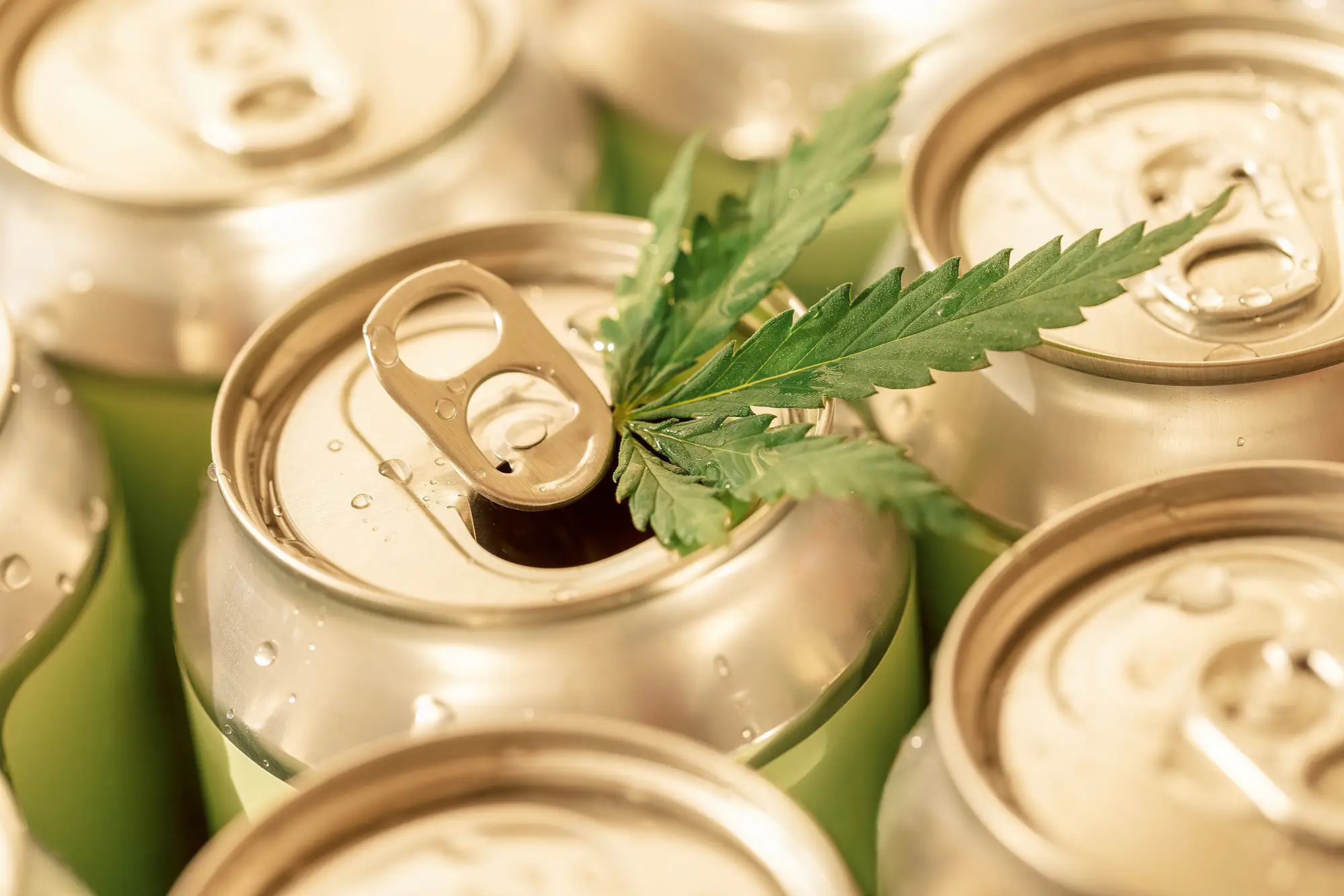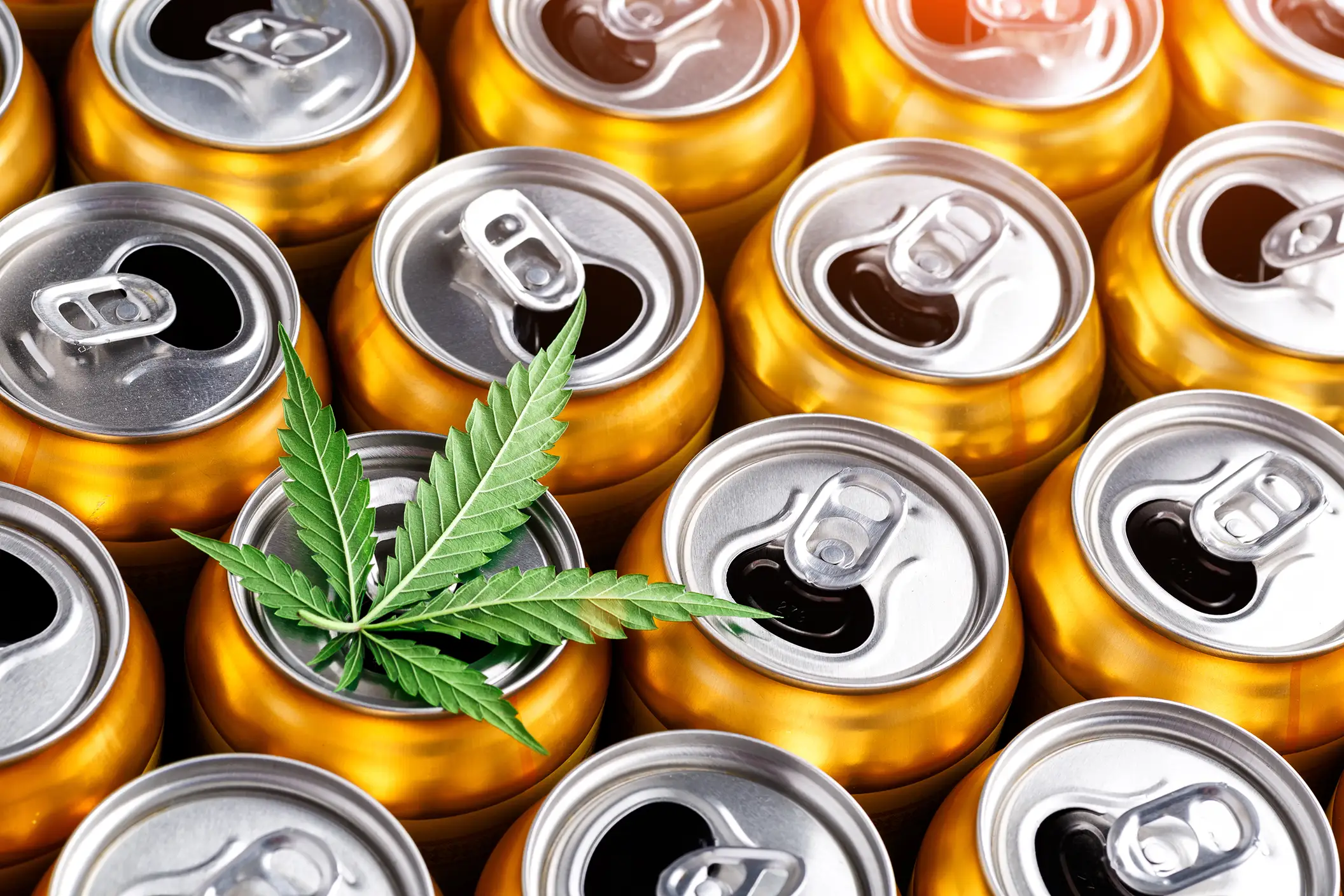
The craft beer industry and consumer trends are fluid right now (no pun intended). With the industry struggling, breweries are looking for new ways to appeal to their audience—namely, the younger crowd, who either drink less or avoid drinking altogether. One emerging market that craft breweries have been dipping their proverbial toe into recently is hemp-based THC beverages.
According to NielsenIQ Associate Director of Beverage Alcohol Thought Leadership Kaleigh Theriault, in a presentation Ollie attended at Brewbound Live, seventy-eight million Americans reported consuming cannabis, and thirty percent of the U.S. adult population self-identifies as a cannabis consumer. This number has doubled in the last few years. Theriault also mentioned they’re currently tracking over $70 million in sales of this “fifth category,” which includes drinks with cannabis, THC, hemp, Delta-8, or Delta-9.
But making hemp-based THC beverages comes with a lot of responsibilities, including compliance checks, regulations, permits, and more. It certainly can leave brewery owners scratching their heads. We chatted with John R. Szymankiewicz, founder and owner of North Carolina-based Beer Law Center, a boutique law firm specifically focused on alcohol law, to find out everything brewery owners need to know to enter a burgeoning new channel in the industry, including the regulations in place, the top issues breweries face, and what brewery owners need to be fully compliant.
What We’ll Cover in This Piece:
Affordable, Industry-Leading Brewery Software
What Is the Beer Law Center?
A former engineer and project manager, Szymankiewicz had a passion for home brewing before he ditched the engineer role to go to law school.
“I’ve homebrewed for twenty-eight years;I’d been an engineer and wanted to do something better, so I come to the law as Career 2.0” Szymankiewicz says. “I enjoy drinking and making beer and love the industry..”
Szymankiewicz graduated with a law degree from NC Central University Turner School of Law in 2010, starting Beer Law Center soon after graduation.
“I like to compare [alcohol law] to that quote in Princess Bride when Inigo Montoya says, ‘You keep using that word. I do not think it means what you think it means,’” says Szymankiewicz, who has made it his mission to help breweries understand the legal issues around making alcohol. “We saw there wasn’t anyone dedicated to the craft beverage segment, and now that’s all I do.”
Szymankiewicz adds that it’s unusual for a lawyer to be completely devoted to alcohol law, pointing out there are only about fifty such practitioners in the country.
He says to think of Beer Law Center as a firm focused on business law with an alcohol overlay, helping with corporate structure, licensing, permitting, trademarks, federal law, buying and selling, and more.
“We help sort through things and help you know what it all means,” Szymankiewicz says. “We found that over the years, Beer Law Center has turned into more of a business counselor.”
What to Know About Regulations When Venturing Into Making THC Beverages

Photography courtesy of Kimzy Nanney | Unsplash
Szymankiewicz says brewery owners are aware of the many laws and regulations regarding alcohol.
The same cannot be said about THC-based beverages.
“With THC, there are damn little in terms of regulations. It was completely illegal until a few years ago,” he says. “And in the past ten years, the science is moving faster than the regulations.”
Szymankiewicz says that THC is growing as rapidly today as hard seltzer in the past. And the fact that there are virtually no regulations could come back to haunt the industry if not dealt with carefully.
“If something bad happens, governments will step in, and we’ll get answers we aren’t going to like,” Szymankiewicz says, noting how important it is to understand how to properly make your target product. “So, if I’m a producer, what do I need to do?”
Szymankiewicz says that the first thing to be mindful of is whether your product is hemp-derived or derived from something else—whether Delta-8, Delta-10, or a synthetic non-plant product, among others.
“Cannabis as a plant is federally illegal,” he says. “But if it has less than 0.3% Delta-9 THC, then it’s hemp, and it’s legal—then I can make something with it.”
Szymankiewicz stresses to know the supplier you are working with to get the Delta-9 THC product.
“As far as federal and state governments are concerned, in most states where it’s not legal, bringing in a chemical greater than 0.3% THC is like bringing in a kilo of cocaine,” Szymankiewicz says. “If it’s greater than 0.3% THC by dry weight, it’s still a Schedule 1 drug. It’s got to still be hemp, 0.3% or less THC by dry weight, to even be allowed onto a bonded alcohol production facility.”
Once you get it in your facility, from there, it’s the manufacturer’s responsibility to figure out how to make a non-alcoholic beverage using the hemp-based THC emulsion oil.
“But it can’t be more than 0.3% [hemp-based THC] by dry weight,” Szymankiewicz says. “The more sugar, the more flavor, the more Delta-9 THC you can add.”
Based on that, beverages can contain different milligram doses of the Delta-9 THC 0.3% solution, which can have different impacts on different people. The effects are another regulation that the industry is evaluating.
“We are comfortable with alcohol being one drink per hour,” Szymankiewicz says. “But this is different. We don’t know how this will affect people.”
He says that, in terms of dosage rate, it’s up to the manufacturer in most cases unless the state has regulated the dosage amounts per package in states where cannabis is legal. But he is seeing a typical range develop.
“In general, I tend to see rates between 3mg and 10mg in twelve to sixteen-ounce packages,” Szymankiewicz says. “But I would strongly suggest that there are labeling or educational materials developed for the products to indicate that.”
Szymankiewicz adds, “Unlike alcohol, it can be difficult to predict an individual person’s reaction or experience with a given dose, so start small.”
Szymankiewicz says that making hemp-based THC products is similar to making soda—considered a food product—and should abide by FDA regulations. As a brewery, you have to register as a food facility, so you are already primed to make the product.
He cautions that right now, the inclusion of THC beverages into the industry is like the Wild West.
“A lot of people will get into it, and the law will change—things are going to change in the next several years—and people will get out of the THC beverage game,” he says. “But there’s no reason if you have a brewery you shouldn’t do it, especially if you have a taproom.”
Federal vs. State Regulations on Making THC Beverages

Federally, Szymankiewicz says there is not much regulatory movement.
“The federal government is not doing a damn thing right now,” he says. “The [2018] Farm Bill passed and essentially created this situation. As long as it’s hemp, the states and government cannot restrict it. There is talk and discussion about rescheduling cannabis to a lower drug schedule, but that’s the most we’ve seen federally in years.”
The regulatory focus is all on the state level. But Szymankiewicz says that once the federal government makes cannabis legal, that level of regulation will likely get much much easier.
“Right now, because the states are going in different directions, it’s almost exclusively [regulated] at the state level,” says Szymankiewicz.“It’s important to talk with someone who knows the regulations within your state before going forward.”
Szymankiewicz recommends first checking whether cannabis is legal in your state and for what purpose. States can’t stop you from making a hemp-based product, but if hemp is listed as a food product, they may be able to prevent you from manufacturing it.
However, many states have not implemented any regulations. “With no regulations, it’s more flexible,” he says, noting that any uniformity of rules down the line is unlikely. “It’s been one hundred years since Prohibition, and we don’t have a uniform alcohol system. Getting anyone to agree seems impossible.”
Szymankiewicz says the future will likely see states fall into one of the camps that already exist when it comes to alcohol—a license state or a control state.
“California is a license state where you get a Type X license (for alcohol) allowing you to make a product,” he explains. “North Carolina is a control state, meaning you have to be a brewery and have wholesale and retail permits. There are, of course, more details than that, but that’s the gist of it.
“I would expect that for THC regulations, the states will fall into similar camps as with alcohol regulation. But, right now, since it’s still federally illegal, there are states like Virginia where they regulate the production and sale of finished hemp/THC products such as alcohol edibles and THC/hemp-derived beverages as well, while not yet being completely ‘cannabis-legal’ as a state.
Szymankiewicz adds, “Until every state is forced to adopt *some* regulation of THC, then you’ll still have a third option – like NC for THC right now, where the law is essentially silent. In that case, it’s really wide open. I mean, if it’s not ‘illegal’ under the law then it’s ‘legal,’ right? Likely, hemp-based THC beverage industry will probably end up with two or three different regulatory models.”
How Many States Allow Manufacturing of THC Beverages?

Currently, all states allow the manufacturing of hemp-based THC beverages, and most states have no regulations around it.
“If it’s a hemp-derived product, it’s legal, and every state allows it,” Szymankiewicz says. “California can only sell [to consumers] through dispensaries. North Carolina hasn’t said anything about where it can sell or age allowed.”
Szymankiewicz thinks the product should be regulated within the industry; if not, lawmakers will regulate it, and it won’t be good.
“You have to watch out for bad actors out there,” he says. “Where did you get your THC product—is there a chain of custody showing how the product got from a plant to an emulsion oil? You want to make sure it’s of good quality and that it was treated properly.”
That is why Szymankiewicz believes breweries or wineries are best suited to make hemp-based THC beverages.
“For THC, breweries and alcohol producers know how to make their stuff and how to package it, pasteurize, cold storage, et cetera,” he says. “And in retail, we know intoxication and how to manage that. How well is a dispensary in handling that?”
He adds, “I’d rather see an alcohol producer doing it because they know what they’re doing.”
What Is the Top Issue When Making THC Beverages?

Photography courtesy of Cycling Frog
Szymankiewicz sees serving hemp-based THC beverages as the main issue with this segment of the beverage industry.
“Keep in mind that it’s not alcohol. It’s like it, but it’s not,” he says. “That means it’s hard to predict how [a particular] dose will affect a certain person.”
Szymankiewicz reiterates, “Alcohol we can safely assume one drink an hour is probably fine. THC has different bioactivity. How it’s emulsified, the source of the THC, or how it’s packaged makes a difference. One 3mg dose might affect one person in ten minutes and then forty-five minutes for another person. There’s just not a lot of consistency among different products/producers right now.”
Beer Law Center’s Checklist for Breweries Looking to Make THC Beverages

Szymankiewicz says he’s working on a tool that can provide a compliance checklist for breweries looking to make hemp-based THC beverages.
“Everyone is having the same conversation, asking the same questions,” he says. “And some lawyers don’t have the answers but provide best practices.”
Szymankiewicz says just to get the product, make a hemp-based THC beverage, pack it, and treat it like a soda.
“Register with the FDA, then check with state guidelines, and then it’s risk management,” he says. “Talk to a lawyer licensed in the state.”
Szymankiewicz admits that many brewers like to do things on their own. He advises, if going that route, to do an Internet search for THC laws in your state to at least see what’s on the books and whether you need to do something. But with so much up in the air, Szymankiewicz says it’s good practice to have a relationship with an attorney.
“You don’t need a lawyer on retainer. Just have a relationship with an attorney,” he says. “I have a bunch of clients who call me when they need me. A relationship to call and ask.”
Szymankiewicz also says to consider some budget for your brewhouse when making THC beverages as there can be unknowns.
“THC is an oil and emulsified in a seltzer,” he says. “Things to consider are the soft parts in your brewery. Will any host bring THC flavors? What about draft lines? Should I have a dedicated line?”
Other things to consider include altering your liability insurance or getting secondary insurance to account for THC in your building.
“It’s the same liability with alcohol, especially on the retail side. On the production side, same product liability stuff,” he says. “If you are going to do it, extend the insurance policy to extend to that. Though some companies are much more willing to work than others.”
In addition, Szymankiewicz recommends setting up a Google alert with several keywords related to THC law and your state. This way, you’ll be notified when things happen.
“If you aren’t actively involved in the process, this is a great mechanism to find out about things as they happen,” he says.
How Can You Get a Hold of Beer Law Center?

Szymankiewicz is not licensed in all fifty states, but he notes that the alcohol law industry is extremely small. He knows many lawyers who specialize in alcohol law and can either help you directly or put you in touch with a lawyer licensed in your state.
You can find everything you need to know at www.beerlawcenter.com, on all the social media sites @beerlawcenter, or email Szymankiewicz directly at [email protected].



